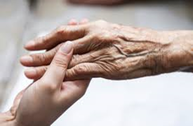Census data shows that there are more people between the ages of 60 and 100 alive today than there has ever been in the past. According to life span theories, there are limits to successful aging and well-being. While the senior years tend to be a period of introspection, reflection and self-acceptance, old age is also associated with a number of stressors including health and physical limitations, losses, and social isolation. As such, there seems to be a need to consider how geriatric counselling can help the elderly to better manage their stressors in order to prevent emotional deterioration and improve well-being.
The most prevalent emotional theme in therapy with the elderly individual involves that of mortality, loss and bereavement. Typically, this population group is confronted with a multitude of losses including the loss of independence, the loss of loved ones, and ultimately, they are faced with their own mortality. In addition, consequences of deteriorated health can also be far reaching. Health issues may impact on the individual’s ability to participate in everyday roles involving outdoor activities, voluntary work and grandparenting. Furthermore, as a result of physical or cognitive losses, the elderly individual may also experience difficulty in being able to pursue interests or hobbies which previously may have provided a sense of purpose and meaning in life. In therapy, a sense of physical and emotional powerlessness is thus common.
In terms of the typical mental health profile of the elderly client, Generalized Anxiety Disorder tends to be the most common anxiety-related condition in the geriatric population. Chronic pain as a result of conditions such as arthritis and delayed healing from injuries can also contribute to symptoms of depression. The prevalence of dementia also increases substantially with age. Research estimates that 5% of those over age of 65 suffer from dementia, but that percentage increases to 30% in adults over the age of 85. Contrary to popular belief, Substance Use Disorders are also prevalent in the geriatric population. Alcohol and prescription drugs are often the drug of choice with the health-related consequences which include malnutrition and cognitive decline. The common triggers tend to be retirement, relocation, financial concerns, deteriorated physical health and death of a spouse.
Based on the above, it is not surprising that elderly individuals may internalize negative images of aging and incorporate it into their life stories. This being the case, the self-image would incorporate themes of powerless and loss. However, an empathic and trusting therapeutic relationship makes it possible for an alternative narrative to emerge, one which celebrates the client’s accomplishments, strengths and positive attributes. Through the process of therapy, the elderly client can regain a positive sense of self, ultimately perceiving the self as a survivor who has succeeded in overcoming a multitude of obstacles and challenges.
For further information on geriatric counselling services please Contact Ushmita Nana. Group discount rates applicable for residents of senior citizen care facilities.
The most prevalent emotional theme in therapy with the elderly individual involves that of mortality, loss and bereavement. Typically, this population group is confronted with a multitude of losses including the loss of independence, the loss of loved ones, and ultimately, they are faced with their own mortality. In addition, consequences of deteriorated health can also be far reaching. Health issues may impact on the individual’s ability to participate in everyday roles involving outdoor activities, voluntary work and grandparenting. Furthermore, as a result of physical or cognitive losses, the elderly individual may also experience difficulty in being able to pursue interests or hobbies which previously may have provided a sense of purpose and meaning in life. In therapy, a sense of physical and emotional powerlessness is thus common.
In terms of the typical mental health profile of the elderly client, Generalized Anxiety Disorder tends to be the most common anxiety-related condition in the geriatric population. Chronic pain as a result of conditions such as arthritis and delayed healing from injuries can also contribute to symptoms of depression. The prevalence of dementia also increases substantially with age. Research estimates that 5% of those over age of 65 suffer from dementia, but that percentage increases to 30% in adults over the age of 85. Contrary to popular belief, Substance Use Disorders are also prevalent in the geriatric population. Alcohol and prescription drugs are often the drug of choice with the health-related consequences which include malnutrition and cognitive decline. The common triggers tend to be retirement, relocation, financial concerns, deteriorated physical health and death of a spouse.
Based on the above, it is not surprising that elderly individuals may internalize negative images of aging and incorporate it into their life stories. This being the case, the self-image would incorporate themes of powerless and loss. However, an empathic and trusting therapeutic relationship makes it possible for an alternative narrative to emerge, one which celebrates the client’s accomplishments, strengths and positive attributes. Through the process of therapy, the elderly client can regain a positive sense of self, ultimately perceiving the self as a survivor who has succeeded in overcoming a multitude of obstacles and challenges.
For further information on geriatric counselling services please Contact Ushmita Nana. Group discount rates applicable for residents of senior citizen care facilities.

 RSS Feed
RSS Feed